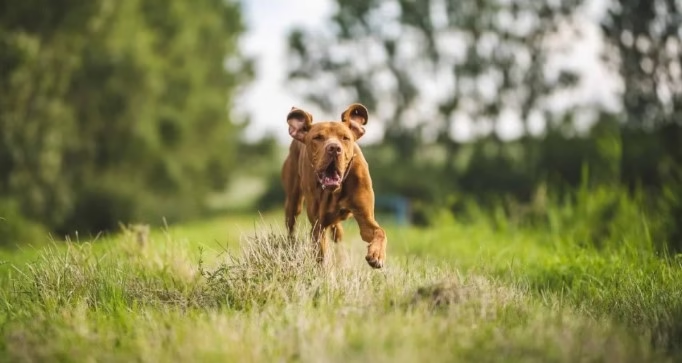Dog Barking and Growling at Nothing at night? Here’s What It Might Mean
Introduction
It can be startling and even a little eerie when your dog suddenly starts barking or growling at what appears to be nothing. You look around, see no one and nothing out of the ordinary, yet your dog barking remains on high alert—focused, tense, and vocal. Many pet owners have experienced this behavior and wondered if it’s a sign of a deeper issue, a supernatural encounter, or simply a quirky habit. While it may seem mysterious, there are actually several logical and science-backed reasons why your dog might react this way.
dog barking have heightened senses far beyond our own, and they often pick up on things humans can’t see, hear, or smell. In this article, we’ll explore the most common causes behind this puzzling behavior, from instinctive responses and health issues to environmental factors. Understanding these triggers can help you better respond and ensure your dog’s well-being.
Natural Instincts and Heightened Senses

dog barking experience the world very differently than humans, relying heavily on their acute senses of smell and hearing. What may seem like “nothing” to us could be something significant to your dog—a faint noise, a distant animal, or even a scent carried on the wind. Their instinct to protect and be alert often kicks in when they detect unfamiliar stimuli, even if it’s imperceptible to you. This natural vigilance is rooted in their ancestry as hunters and guardians, making occasional unexplained barking or growling completely normal behavior.
Reaction to Small Animals or Insects
One of the most common causes behind a dog barking or growling at “nothing” is the presence of tiny animals or insects. Mice behind the walls, bugs scurrying under furniture, or even a squirrel outside the window can trigger a strong reaction from your dog barking . Their keen senses allow them to detect these creatures long before we do. In these cases, yourdog barking isn’t imagining things—they’re responding to a real, though subtle, stimulus in their environment.
Territorial Behavior
Dogs are naturally territorial animals. They instinctively guard their home and family, and any perceived intrusion—real or imagined—can trigger barking or growling. This response may be caused by something as subtle as a sound outside, a neighbor walking by, or even a new scent in the air. Even if you can’t see the cause, your dog might be reacting to a change in their territory. This protective instinct is especially strong in certain breeds and can occur more frequently during times of heightened alertness.
Fear or Anxiety Triggers
Fear and anxiety are powerful emotions in dogs and can cause them to react vocally, even when there’s no visible threat. Common triggers include loud noises, sudden movements, unfamiliar people or animals, or changes in routine. Dogs suffering from anxiety may also be more sensitive to minor environmental changes. When they bark or growl at “nothing,” it could actually be a response to an internal stressor, such as separation anxiety or past trauma, rather than an external stimulus.
Cognitive Dysfunction in Older Dogs
dog barking age, they can develop cognitive dysfunction syndrome (CDS), which is similar to dementia in humans. This condition can lead to confusion, disorientation, and behavioral changes—including barking or growling at seemingly nothing. Older dogs with CDS may forget familiar surroundings or feel unsettled without a clear reason. If your senior dog is showing signs of this behavior along with disrupted sleep, house soiling, or increased anxiety, it’s a good idea to consult your veterinarian for guidance and possible treatment options.
Attention-Seeking Behavior

Sometimes, barking or growling at nothing is simply a learned behavior. If your dog barking notices that barking gets your attention—even if it’s just to tell them to stop—they may repeat the action for that very reason. Dogs are smart and often use vocalizations to communicate their needs or desires. If they’re bored, lonely, or craving interaction, they might bark at “nothing” just to engage you. This type of attention-seeking behavior is common in dogs that don’t receive enough mental stimulation or physical activity.
Response to Environmental Changes
dog barking are highly sensitive to changes in their environment, and even small shifts can trigger a reaction. Rearranged furniture, new smells, strange sounds, or guests visiting your home can all make your dog feel uncertain or alert. These unfamiliar changes may prompt them to bark or growl as they try to make sense of what’s going on. While we might overlook such adjustments, dogs often notice them right away and respond instinctively to what they perceive as potential disruptions.
Signs of a Medical Issue
Unexplained barking or growling can sometimes be a sign of an underlying medical issue. Pain, discomfort, or neurological problems—such as seizures or brain disorders—can cause sudden changes in behavior. If your dog barking begins barking at nothing frequently and also shows signs like restlessness, changes in appetite, limping, or unusual aggression, it’s important to consult a veterinarian. Medical conditions affecting hearing, vision, or cognition might also make your dog feel vulnerable or confused, leading to vocal outbursts in seemingly random situations.
Is It Something Supernatural?
Many pet owners have wondered whether their dog’s odd behavior could be linked to something paranormal. Dogs have been featured in ghost stories and legends for centuries due to their ability to sense things beyond human perception. While there’s no scientific proof that dog barking can detect spirits, their heightened senses often make them react to stimuli we can’t detect—like subtle vibrations, sounds, or energy shifts. Whether you believe in the supernatural or not, this theory continues to intrigue and divide pet lovers.
How to Respond When It Happens
When your dog barking starts barking or growling at nothing, the best approach is to stay calm and observe. Reacting with frustration or fear can escalate the behavior or confuse your dog further. Instead, try to gently redirect their attention with a toy, a treat, or a command they know. Look around for any possible triggers, such as a small animal, a strange sound, or a new object. If the behavior is occasional and short-lived, it may not be a cause for concern. Consistent patterns, however, should be monitored closely.
When to See a Veterinarian or Trainer

If your dog frequently barks or growls at nothing and the behavior becomes disruptive, stressful, or intense, it’s time to consult a professional. A veterinarian can rule out medical issues, including pain, cognitive decline, or sensory impairments. If your dog is healthy but still acting out, a certified dog trainer or behaviorist can help identify behavioral causes and develop a management plan. Early intervention is key to preventing the behavior from becoming a long-term problem or affecting your dog’s overall well-being.
Conclusion
While it can be unsettling to see your dog barking or growling at what appears to be nothing, there’s often a logical explanation behind the behavior. Dogs rely on their heightened senses and instincts to interpret the world, and what we can’t perceive may be very real to them. From natural stimuli and territorial instincts to health issues or anxiety, many factors can influence their reactions. By observing closely, responding calmly, and seeking professional advice when necessary, you can better understand your dog barking ’s needs and ensure their comfort and safety.
You Can Also Read: Why Your Dog Ignore You: Top Reasons and How to Fix It
FAQS
Why does my dog keep growling and barking at night?
When your dog barking barks, growls, or whimpers in their sleep, it is simply because they are dreaming. As long as the dog barking does not exhibit signs of illness or severe physical distress, there is no need to worry. You might even find it fun to imagine what your canine friend is dreaming about. Author Bio:
Why is my dog barking at nothing at night?
There are many reasons why dogs bark at night, from territorial instincts, fear, anxiety, boredom, loneliness or underlying medical illnesses. It’s important for dog barking parents to understand the reason behind this behaviour, in order to stop their dogs barking at night. We explain the potential reasons below.
Why does my dog stare and growl at nothing all?
Dogs have heightened senses and may growl or stare at things beyond human perception, such as faint noises, unfamiliar scents, or even subtle changes in their environment. This behavior is typically protective or cautious. If it becomes excessive, ensuring mental stimulation and a calming routine can help.
Should I ignore dog barking at night?
They need to learn that barking at night isn’t behaviour you approve of, or want them to display. Even talking to them with soothing words in an attempt to comfort them can encourage the barking to continue, so it’s best to stay quiet and ride through the pain.
How to stop sleep aggression in dogs?
Top tips to avoid Sleep aggression:
Have your hound sleep in a separate room, this reduces the chances of anyone accidentally coming into contact with them whilst they are asleep. If your hound sleeps on your bed, teach them “off.” Call them on to the bed and reward them, encourage them off with a reward.
